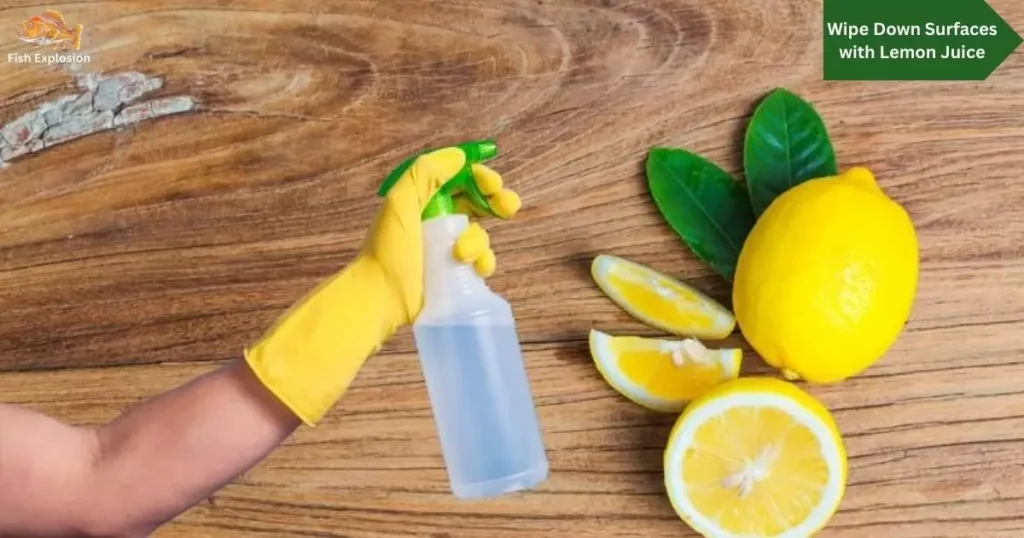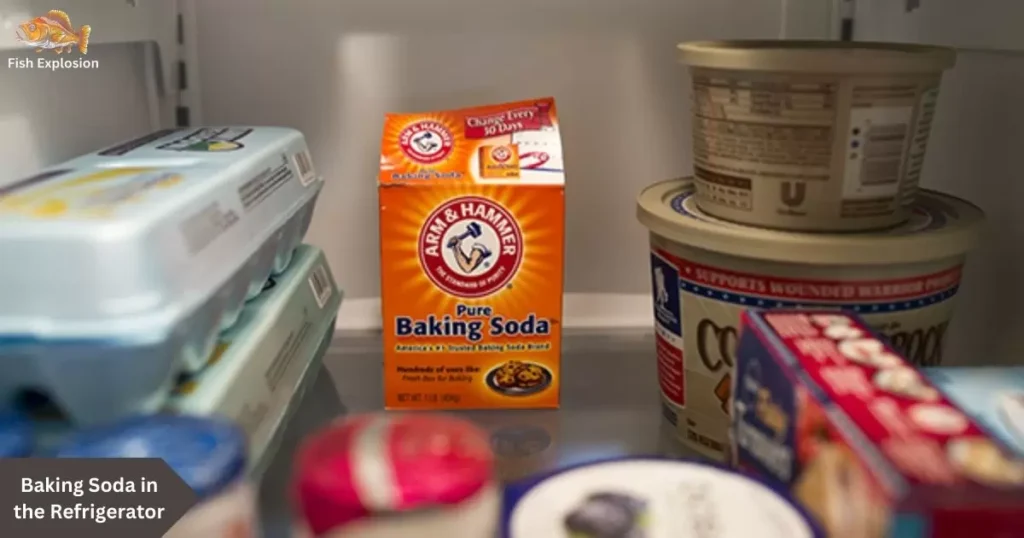Fish is a mouthwatering ingredient for many meals, but it can also leave undesirable odors staying in your home long after dinner is over.
The strong smells created by cooking fish like salmon, cod, tuna, and Doomsday Fish can saturate carpets, upholstery, and even your clothes if not addressed appropriately. Fortunately there are several persuasive ways to banish fish smells and keep your home refreshed.
This guide will analyze 14 tried-and-true methods for stopping pesky fish odors from all areas of your house. From placing bowls of vinegar around the home to washing fabric items in a solution of lemon juice and baking soda, we’ll reveal natural and inexpensive solutions to fully remove traces of fish smells so you can enjoy seafood any time without worry.
Open Windows

Opening windows is an essential way to circulate homes and keep the air feeling fresh. With more generous weather arriving, it is a good idea to open several windows throughout the house each day. Allowing fresh air to circulate through the home helps renew the oxygen and clear unwanted odors. One smell that can linger is the aroma of cooking fish.
Let fresh air circulate through the home to air out fish smells from sticking around too long. Cross ventilation where windows on different sides of the house are opened allows quicker air exchange. Opening windows in multiple rooms allows the fresh breeze to flow all throughout the interior and prevents any leftover scents.
Use an Air Purifier
On days when windows are not sufficient for clearing out unwanted scents, utilizing an air cleaner can help freshen the indoor air. Air cleaners work to clean the air in the room by using a filter to maintain contaminants like allergens, dust, and other particles flowing through the air. When fish is cooked growing strong smells, an air purifier can make a difference in stopping remaining odors.
Purifiers can capture and remove fish odor molecules from the air, balancing the fishy aroma that might otherwise linger long after the meal is done. Choosing a purifier with a HEPA filter is effective for tackling tough smells from fish preparation. Running the purifier for an hour or more helps scrub the air clean.
Boil Vinegar on the Stove
Removing undesirable kitchen odors can sometimes take an extra step further than just opening windows. A simple and affordable method is to boil vinegar on the stove. It has natural cleaning properties that assist break down odor molecules in the air. To utilize this manner, get white vinegar to a boil in a pot on the stovetop.
The vapors emitted from the simmering vinegar will help absorb smells caused by fish, onions, garlic, and other pungent foods. Boil the Vinegar on the Stove for 20 minutes or so to allow the vinegar to stink to flood the air and balance odors. The boiling vinegar not only removes bad smells but leaves behind a fresh, clean scent too. It’s an easy hack to deodorize a kitchen.
Sprinkle Baking Soda
Baking soda has numerous household uses as a natural alternative to harsh chemicals. It can be scattered in places where odors originate to temporarily neutralize them. When sprinkled in malodorous areas like the refrigerator, garbage cans, or anywhere mold or mildew may grow, it absorbs disagreeable smells. Thoroughly shake baking soda onto a damp cloth or paper towel and brush down surfaces to clean and deodorize.
Its absorptive nature sketches in foul odors, leaving behind a modest fresh scent. Carpets can also be strewed with baking soda to help eliminate pet odors and freshen up the entire room. Not only does baking soda effectively clear odors, but it also helps as a reasonable and beneficial product for general cleaning and deodorization of the home.
Light Candles

Lighting candles is a good way to freshen up the air in your home after cooking fish. The candle smells can help conceal lingering fish scents that might be difficult to remove otherwise. Scented candles emit pleasant fragrances that fill a room and counteract odors from previous meals.
Floral or baked goods scents work especially well to mask fishiness. Visually, candles also create an uplifting ambiance. So light a candle and let its warm glow and fresh aroma work to banish leftover food smells.
Place Open Bowls of Coffee Grounds
Place open bowls of used coffee grounds around your home to help eliminate unwanted odors. Coffee grounds have a powerful ability to absorb smells from the air. As the wet grounds dry out, they will soak up lingering fish, smoke, or cooking smells that plague a room after dinner.
The grounds draw in offensive scents and trap them, leaving the space with a fresher environment. Change out bowls every few days for the best effect. Their odor-fighting qualities leave the home feeling cleaner and more uplifting without using chemical air fresheners.
Wipe Down Surfaces with Lemon Juice

Lemon juice is a mild yet effective cleaner that can leave any surface with a refreshed, clean scent. Just slice a lemon in half and tap down counters, tables, and even wood furniture with the cut side of the lemon.
The citric acid in lemons performs as a genuine antibacterial to kill germs and bacteria. It also illuminates other textures by releasing built-up grime and blots. In addition to leaving surfaces clean, the lemon smell lingering in the air fights odors and makes the whole room feel refreshed.
Use an Essential Oil Diffuser
Essential oils not only offer diverse aromatherapeutic advantages for calming the mind and pinching mood, but their scents can also naturally cleanse indoor air when used with a warm mist diffuser. Choose essential oils that have potent purification properties such as lemon, juniper berry, or tea tree, and add a few drops to the diffuser water.
As the diffuser mists the soothing scents around the home, it also works to break up trapped pollutants and odor molecules in the air. The naturally sanitizing scents spread throughout the entire space for a light aromatherapy experience that cleans without harsh chemicals.
Hang Damp Sheets Outside
On a sunny day, hang freshly washed, but still damp, sheets outside to dry completely. The sun’s UV rays have natural bleaching properties that will help disinfect and deodorize the fabrics. Simply drape damp sheets over a clothesline away from direct sunlight initially to prevent damaging the material. Allow plenty of time for sheets to dry in the fresh air before folding, and they will be sanitized, smelling fresher than if dried inside.
Run the Dishwasher or Wash Dishes
Running a hot cycle in the dishwasher or washing dishes by hand with hot, soapy water enables sanitizing all dishes and spoons. The hot temperature destroys bacteria and germs that may have been collected.
Be sure to use a dishwashing liquid or detergent that includes antibacterial elements to further purify surfaces. Wash individually any dishes used for natural meats. Air drying the sanitized dishes helps keep them fresh until the next use.
Vacuum and Clean Hard Surfaces
It is important to regularly vacuum and clean difficult surfaces in your home like floors, carpets, countertops etc. This enables the removal of dust, dander and other allergens that could activate allergies.
Vacuuming thoroughly helps remove leftover fish particles causing smells that may linger otherwise. Making sure to change vacuum bags and wash dusting cloths frequently keeps surfaces free of allergens and prevents them from recirculating back into the indoor air.
Use Activated Charcoal Bags
Activated charcoal has outstanding absorption properties and can help decrease indoor air pollutants, odors, and gases. Place started charcoal bags in different rooms throughout your home, particularly in areas like the kitchen or living room. The charcoal will soak odors and chemicals in the air, helping boost better and fresher indoor air rates. Change the charcoal bags every few months for best results.
Ventilate the Home Overnight
Opening some windows before bed allows for airflow throughout the home while you sleep. The circulated air helps remove indoor pollutants and smells and keeps the air from getting stale. Bacteria, chemicals and vapors that collect indoors are ventilated out. Waking up to fresh indoor air is more stimulating and enhances the overall air quality of the home.
Place an Open Box of Baking Soda in the Refrigerator

As a biological odor absorber, baking soda can help mask offensive refrigerator odors. Place an open box on the shelf or in the veggie compartment. The baking soda will trap odors caused due to food spills and residue. It is inexpensive and effective in eliminating musty scents. Change the box every couple of weeks for best results. The fresh smell counteracts odors throughout the refrigerator.
Why Does Fish Cause an Unpleasant Smell in the Kitchen?
Fish has a very unlike smell when being cooked that can linger in the kitchen long after preparation. This is due to mixtures found in fish called trimethylamine oxide and trimethylamine. When fish is warmed during cooking, enzymes in the fish flip trimethylamine oxide into trimethylamine, which delivers that typical fishy odor.
The smell can be hard to remove from surfaces and cling to fabrics. Proper ventilation and cleaning can support reducing the fish smell in the kitchen so it does not evolve overpowering.
Which Types of Fish Smell the Least?
Tilapia: Tilapia has a very gentle flavor and does not have a strong fishy odor even after cooking. It’s one of the least smelly freshwater fish.
Cod: Cod has a fine, mild flavor and is not very pungent. Its texture is also mild and flaky. It’s a great choice for those wanting fish with the tiniest odor.
Haddock: Similar to cod in flavor and consistency, haddock has a very mild fish smell. It won’t leave a lingering smell in your kitchen after preparation.
Pollock: Pollock is a nice mild and white-fleshed fish. It doesn’t maintain onto smells and tastes of the sea very well. Fantastic for people new to eating fish.
Flounder: Flounder has a sweet, mild flavor that’s casual and inoffensive. It won’t cause much of a fishy scent after cooking.
Sole: Both lemon sole and Dover sole have peaceful, delicate flavors that are not very fishy. They have soft thin fillets that don’t linger in the nose.
Catfish: Catfish meat has an apathetic, mild taste. It’s fairly inodorant even after cooking. Most catfish combinations like channel catfish don’t smell strongly of fish.
FAQ’s
How to remove the fish smell after cooking?
Open all windows and use an air freshener, citrus fruits or boiling vinegar to remove the fish smell.
How do I make my house smell good after frying fish?
Boil lemons or citrus fruits on the stove, and use scented candles or an essential oil diffuser with freshening oils to make your house smell good after frying fish.
How do I get the fish smell out of my house?
Bake baking soda in the oven to absorb odors, boil white vinegar on the stove or use activated charcoal bags to get the fish smell out of your house.
How to cook fish so your house doesn’t smell?
Steam, bake or poach fish instead of pan frying, and immediately ventilate by opening windows once cooking to prevent a fish smell in your house.
Conclusion
Fish can often leave behind unpleasant odors in the kitchen after cooking. However, there are several effective methods to help rid the air of fish smells. Opening windows allows fresh air circulation to remove odors. Using an air purifier, boiling vinegar on the stove, or sprinkling baking soda can also help absorb smells. Lighting scented candles provides a pleasant alternative aroma.
Placing open bowls of coffee grounds or wiping down surfaces with lemon juice draws in smells. Running an essential oil diffuser releases cleansing scents. Air drying sheets outside in the sunlight helps disinfect fabrics. Regular cleaning of surfaces, vacuuming, and using activated charcoal bags work to improve indoor air quality over time. With proper ventilation and natural odor removers, the unpleasant smells of fish preparation can be greatly diminished.
With three years of dedicated expertise in the niche of fish, my domain knowledge encompasses breeding, habitat maintenance, health management, and sustainable aquaculture practices, ensuring optimal outcomes in the aquatic realm.











